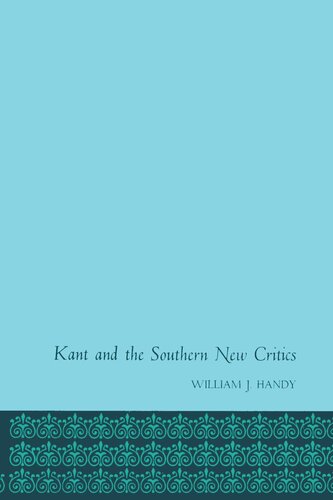

Most ebook files are in PDF format, so you can easily read them using various software such as Foxit Reader or directly on the Google Chrome browser.
Some ebook files are released by publishers in other formats such as .awz, .mobi, .epub, .fb2, etc. You may need to install specific software to read these formats on mobile/PC, such as Calibre.
Please read the tutorial at this link: https://ebookbell.com/faq
We offer FREE conversion to the popular formats you request; however, this may take some time. Therefore, right after payment, please email us, and we will try to provide the service as quickly as possible.
For some exceptional file formats or broken links (if any), please refrain from opening any disputes. Instead, email us first, and we will try to assist within a maximum of 6 hours.
EbookBell Team

4.7
26 reviewsAn author’s true meaning has always been largely a matter of opinion among literary critics, even when only objective language was analyzed. However, a writer’s inner meaning, which perhaps not even he or she consciously realizes, interests the “new critics,” who base their theory of criticism on the writings of Immanuel Kant and hold philosophical values to be essential in studying a literary work. William J. Handy, a former student of John Crowe Ransom, himself a critic of note, reveals the inadequacy of logical concept to represent the full quality of human experience. In Kant and the Southern New Critics he discusses the theories and practices of some pioneers of philosophical criticism—John Crowe Ransom, Allen Tate, Cleanth Brooks, and others—and traces the influence of the Kantian generative idea on their assumption that a work of art is the celebration of one’s qualitative experience. Critics in the new school believe that knowledge of experience is distorted when abstracted into scientific, quantitative notations, and that the artist, to portray things in their more natural state, must employ particulars in order to achieve “universals.” Knowledge of any subject or object must include the aesthetic qualities of imagination and emotion that cannot be discovered through analysis. This study explores Ransom’s theory of “ontological criticism.” The basic difference in symbols representing things and those representing ideas was discerned by Kant, who distinguished between understanding (analysis of an object in order to classify it)and imagination (realization of an object undistorted by logical reduction). Handysuggests that ontological structure requires a writer to use the logic that springs from his image-making faculty—a thought also expressed by T. S. Eliot, who says, “The only way of expressing emotion in the form of art is by finding an ‘objective correlative.’ ” The discipline of philosophical aesthetics is necessary for the critic, Handy says, if his principles are to be substantial enough to make a significant contribution to knowledge of literary theory. This book clearly delineates the origins of a philosophical approach and leads the reader to an appreciation of the deeper enjoyment and meaning it can give to literary experience.